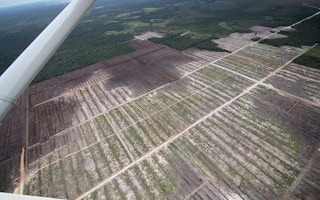In the wake of last year’s devastating forest fires, Indonesian President Joko Widodo’s administration forbid agribusinesses from replanting the desiccated peatlands that had gone up in flames during the disaster. The prohibition was part of a bundle of regulatory changes intended to prevent the annual blaze from recurring.
As 2016 draws to a close, however, some companies appear to be quietly reestablishing their ruined estates. In November, it arose that two units of the Asia Pulp & Paper (APP) conglomerate were replanting burned peat swamps in South Sumatra province, an epicenter of last year’s fires.
The reports came via comments made by San Afri Awang, the Ministry of Environment and Forestry’s director of spatial planning, to the website foresthints.news, which portrayed him as assailing APP for brazenly flouting the state’s regulations.
Others piled on; Indonesia’s largest environmental pressure group, Walhi, condemned the paper giant for “clearly [violating] the law,” and this week the forestry minster reportedly ordered the company to remove the newly installed acacia trees.
Through it all, APP has remained effectively silent, offering only cryptic assurances that it follows “all government regulations and guidelines,” as the paper giant told Mongabay this week. Its response implied that it had done nothing wrong. But further scrutiny points to a reality that lies somewhere in between.
The 2015 Southeast Asia haze crisis has been called the biggest environmental crime of the 21st century. Sweeping across an area the size of Vermont, last year’s fires blanketed Indonesia and its neighbors in smoke, sickened half a million people and released more carbon during the same period than the entire US economy.
Illegal-but-cheap slash-and-burn practices by companies and farmers alike are a big reason the archipelago country burns each year. But the root cause is the large-scale drainage of Indonesia’s vast peat bog zones by the paper and palm oil industries.
Planters dig canals through the soggy turf in order to lower the water table and prepare the land for cultivation. While the practice has opened new frontiers to expand production of the lucrative commodities, it also dries out the peat — rendering it highly flammable.
As last year’s conflagration reached its peak, and with the UN climate summit in Paris just a month away, President Jokowi, as he is known, declared a moratorium on new peatland drainage and ordered firms to restore any peat that had burned in their concessions.
APP was perhaps the most affected: in South Sumatra alone, the fires incinerated 26 per cent of its total planted area, according to an analysis by environmental groups. The destruction of APP’s assets came at a time when the company was constructing a gargantuan new paper mill in the province, whose supply, the NGOs noted, would be jeopardised by the loss of the plantations — and by the government’s ban on resurrecting them.
APP has yet to publicly address the allegations being leveled against it. But Putera Parthama, the Ministry of Environment and Forestry’s director of production forests, told Mongabay last week that at least two APP units had been allowed to replant burned peat with acacia pulpwood trees. “It was for fire prevention,” he wrote in an email.
As Parthama explained it, letting the firms replant would force them to clear the dead and dried biomass that had accumulated in the wake of the fires and that now constituted a fire risk. The policy, he added, would also encourage the companies to protect the land from encroachment by local people.
Growers often fail to patrol the borders of their concessions, even as they are frequently involved in disputes with local people who claim that the land is theirs, or that the firm has broken its promises to the community. This is allegedly the case with one of the APP units in question, PT Bumi Mekar Hijau. (The other is PT Bumi Andalas Permai.)
This story was published with permission from Mongabay.com. Read the full story.










